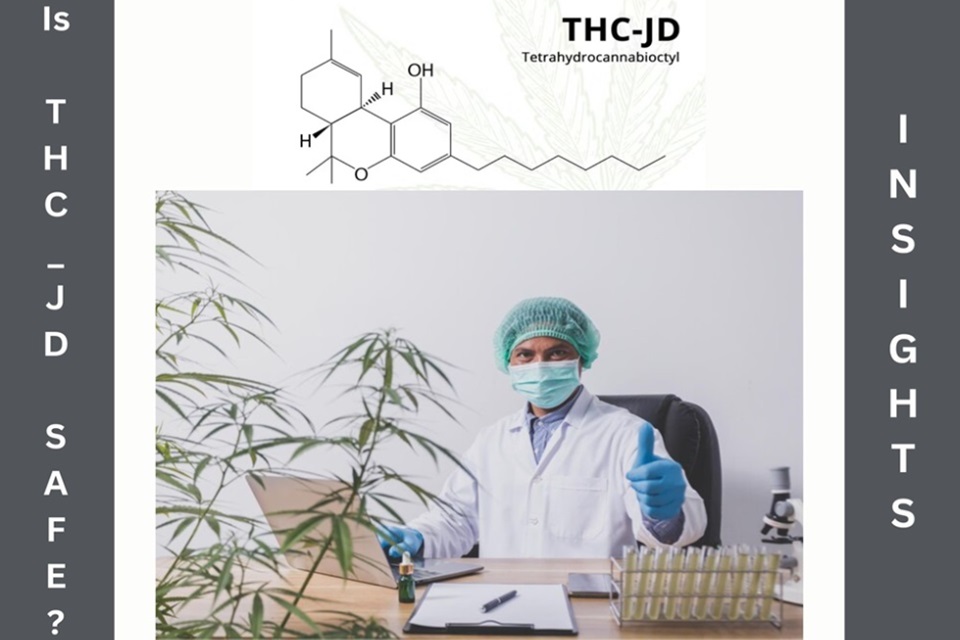
The popularity of cannabis has increased due to the discovery of its most important cannabinoid, CBD (Cannabidiol), which has therapeutic effects and does not cause euphoria like other cannabinoids. On the other hand, THC, known for its psychoactive properties, is responsible for creating the ‘high’ feeling. As interest in cannabis grows, researchers are discovering new cannabinoids. One such cannabinoid is THC-JD, which was found by Italian researchers. In this article, we will explore its chemical composition, its impact on potency, its effects on the human body and brain, and ultimately answer the question: Is THC-JD safe to consume?
Cannabis Plant: Major Compounds
Cannabinoids, terpenes, and flavonoids are all major compounds found in cannabis plants, each with distinct properties and effects. Cannabinoids are special chemicals in cannabis that affect your body, like THC, which makes you feel high, and CBD, which might have health benefits. Terpenes are what give cannabis its smell and taste, much like how oranges have a citrus smell because of terpenes. They also work with cannabinoids to produce different effects, such as relaxation or happiness. Flavonoids are colorful nutrients in cannabis that might contribute to its health benefits. Together, cannabinoids, terpenes, and flavonoids make cannabis special and give it its effects and flavors.
What Is THC-JD?
More than 150 minor cannabinoids have been identified in cannabis plants, and one of them is THCJD, also referred to as Tetrahydrocannabinol. Although it’s classified as a new cannabinoid, its chemical structure suggests that it was actually discovered as early as 1941 under the names THC-Octyl or THC-C8. The name THCJD could potentially be used for marketing purposes or other undisclosed reasons.
Availability: Synthetic Or Natural?
THC-JD, also known as tetrahydrocannabidiol, is a cannabinoid believed to exist naturally in cannabis but only in small amounts. Due to the difficulty of extracting it directly from the plant, THC-JD is created through a chemical process called isomerization from more easily obtainable cannabinoids like CBD. In the lab, CBD is isolated, and then catalysts are used to change its molecular structure, turning it into THC-JD. These semi-synthetic cannabinoids are like building with blocks, swapping some pieces to create something fresh and exciting.
Molecular Structure
THCJD is a compound similar to THC (delta-9-THC), which is categorized as a homologue. Homologues are compounds that share similar chemical structures and properties. The primary distinction between these two cannabinoids lies in the length of their side (alkyl) chains. THC possesses a five-carbon chain, while THCJD has an eight-carbon chain. Research suggests that longer chains may enhance the potency of cannabinoids.
Is THC-JD Legal?
Semi-synthetic cannabinoids, given the green light by the FDA, can be made by altering naturally occurring cannabinoids like CBD, as permitted by the 2018 Farm Bill. However, fully synthetic compounds aren’t protected. In the U.S., where the hemp market is still largely unregulated, the legality of THC-JD is complex. While synthetic cannabinoids are illegal, it’s uncertain if THC-JD occurs naturally or if products labeled as such truly contain it. How companies market their products is largely unregulated, and while medical claims are prohibited, hemp companies can make misleading statements about content. Consumers should scrutinize Certificates of Analysis (COA) to verify product contents. For a product to be considered hemp, like THC-JD gummies or vape carts, it must contain less than 0.3% delta 9 THC by dry weight; otherwise, it’s classified as marijuana, an illegal Schedule I drug.
Is It Safe To Buy THC-JD Labeled Products?
- The safety of THC-JD-labeled products is uncertain due to the lack of regulation and oversight in the hemp market.
- The legality and authenticity of THC-JD in products are questionable, as it’s unclear if this cannabinoid occurs naturally or if products labeled as such truly contain it.
- Regulatory agencies have not thoroughly evaluated the safety and efficacy of THC-JD or its potential health effects.
- Consumers should be cautious when purchasing THC-JD-labeled products and consider factors such as product quality, reputable manufacturers, and third-party lab testing.
- It’s advisable to review Certificates of Analysis (COA) to verify cannabinoid content and ensure compliance with legal limits, especially concerning delta 9 THC levels.
- Opting for products from trusted sources and brands with transparent manufacturing practices can help mitigate potential risks associated with THC-JD-labeled products.
Can A Drug Test Detect THC-JD?
As THC-JD is a relatively new cannabinoid, standard drug tests may not specifically target it. Most drug tests are designed to detect THC (delta-9-tetrahydrocannabinol), the main psychoactive compound in cannabis, and its metabolites. THC-JD is a derivative or variation of THC, but its specific detection would require specialized testing methods that specifically target this cannabinoid. Laboratories may develop specific tests to detect THC-JD if there’s a need or demand for it. However, such tests would not be part of routine drug screenings and would likely be more expensive and less common.
In Summary
In conclusion, while THC-JD holds promise as a newly discovered cannabinoid with potential high potency, its safety and legitimacy in the market remain uncertain. Regulatory agencies have yet to thoroughly evaluate its effects and establish clear guidelines for its production and sale. As a result, consumers should approach THC-JD-labeled products with caution, considering factors such as product quality, reputable manufacturers, and third-party lab testing. Opting for products from trusted sources and brands with transparent manufacturing practices can help mitigate potential risks associated with THC-JD consumption. Further research and regulatory oversight are necessary to ensure the safety, legality, and efficacy of THC-JD products for consumers.
FAQs
Is THC-JD safe to consume?
Safety is uncertain due to the lack of regulation; a cautious approach is recommended. Regulatory agencies haven’t thoroughly evaluated THC-JD’s safety and efficacy.
Can a drug test detect THC-JD?
Standard drug tests may not specifically target THC-JD. Specific tests may be developed but are not common in routine screenings.
What factors should I consider before purchasing THC-JD products?
Scrutinize COAs to verify product contents and compliance with legal limits. Choose reputable manufacturers and prioritize transparency in manufacturing practices.





